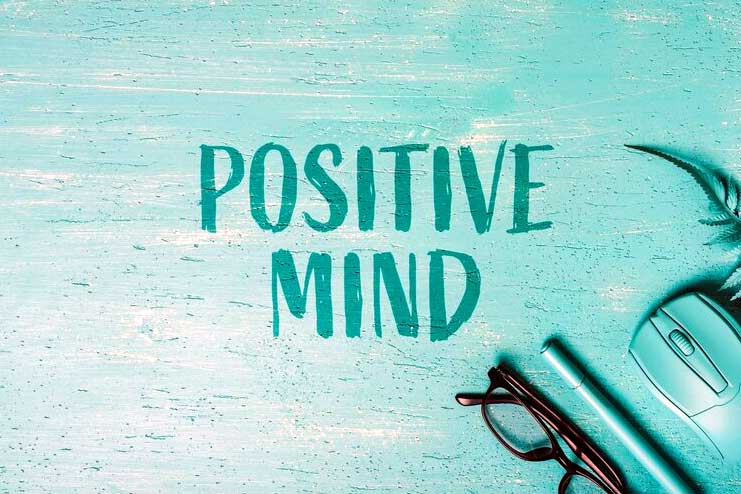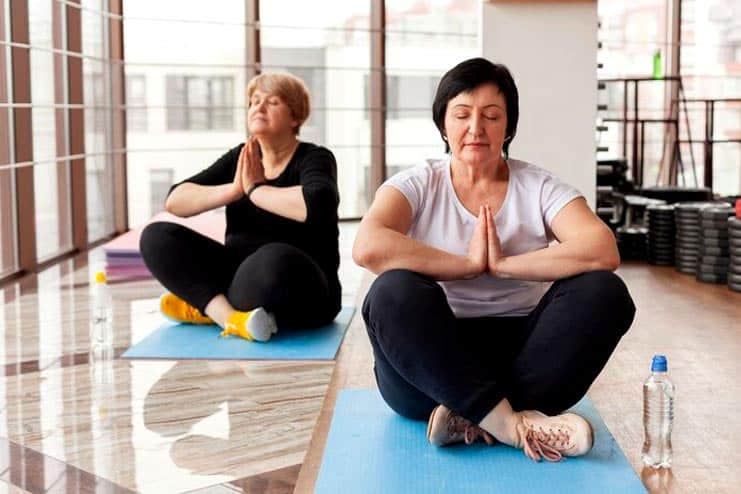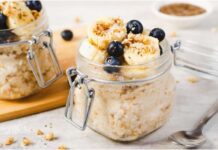Affiliate Disclaimer
Some links in this article are affiliate links. We may earn a small commission if you make a purchase through these links, at no extra cost to you. We only recommend products we find useful to our readersThe need to preserve our health and vigor grows increasingly apparent as we move through life, especially as we age gracefully. Although having a lively life after 50 involves making deliberate decisions and a dedication to well-being, the golden years are supposed to be a period of wisdom, experience, and joy.
Regardless of age or past health issues, taking good care of your body can positively impact your ability to stay active, manage health issues, improve memory, strengthen your immune system, and have more energy.
The article’s primary goal is to provide those in their golden years with practical knowledge and lifestyle choices to help them live vibrant, happy lives. Golden jubilees and vigorous lives are beautiful occasions to celebrate and reflect on life’s accomplishments.
These are also the significant turning moments and milestones in life where you will undoubtedly begin to live a vibrant existence.
1. Embracing a Positive Mindset

An optimistic outlook on life and other aspects of one’s attitude can positively impact one’s general happiness, health, and well-being because there is a strong correlation between the mind and body. Like healthy habits like eating right and exercising frequently, having a happy outlook should be ingrained from a young age.
Making the best of aging and maintaining a cheerful outlook are central to positive aging. It’s about maintaining a growth attitude as optimistically as possible as you mature, no matter what obstacles or risks you face.
It can be easier to go through difficult periods and make life more fulfilling overall if you approach loss or change optimistically. According to research, positive aging encompasses all aspects of life, including financial stability, self-fulfillment, independence, health, personal safety, and living conditions.
It takes deliberate work and repetition to develop a positive mindset about aging. Following are some tips to assist you in cultivating a positive outlook:
Accept yourself as you are: Honor your life’s path and knowledge acquired through experiences. Prioritize developing self-compassion and accepting your aging body. Aging brings possibilities and growth, so learn to be grateful for them.
Nurture Social Relationships:
- Develop deep connections with people in all age groups.
- Take part in clubs, support groups, and community events.
- Seek interactions between generations to help them feel like they belong and have a purpose.
Use constructive self-talk:
- Utilize uplifting statements to counteract pessimistic views about growing older.
- Reframe growing older as a blessing and a chance for personal development.
- Remind yourself of your triumphs and your strong points.
A 2008 study involving 2,873 healthy men and women discovered that, even after accounting for factors like age, occupation, income, ethnicity, obesity, smoking, and depression, a cheerful view of life was associated with a positive mindset and lower levels of the stress hormone cortisol.
2. Nutrition for Longevity

The importance of nutrition as we set out on the path of graceful ageing cannot be emphasized. The food we eat significantly impacts our longevity, health, and well-being.
However, the relationship between diet and aging is also inverse, with macro and micronutrients both essential for preserving good physiological health. Nutrition and lifestyle interventions have potential to promote healthy aging and lower the risk of non-communicable diseases because of the malleability of the aging process.
Our bodies and our needs change as we go through life. Our eating is a critical component of this journey. Our eating habits affect not just our physical well-being but also our aging process. Natural, minimally processed foods that retain their nutrients are known as whole foods. Lean proteins, legumes, nuts, seeds, and whole grains are a few of them. Foods which are high in antioxidants, like berries, nuts, seeds, and leafy greens. An essential contributor to aging and the emergence of chronic diseases, antioxidants fight off oxidative stress. To stay hydrated all day, drink a lot of water. Staying hydrated is essential for preserving the health of your skin, joints, and cells as a whole.
Limiting portion sizes in accordance with age is advantageous to prevent consuming too many calories. Make an effort to eat in moderation, with vegetables taking up the most space on your plate, followed by whole grains and protein. One diet that is recommended for good aging by the majority of medical specialists. Eating mindful entails being aware of and in the moment while eating.
Seniors need to slow down and enjoy their food’s tastes, textures, and scents. Refrain from watching television or using technological gadgets so that you can concentrate entirely on your meal. This habit improves digestion in addition to making meals more enjoyable.
According to research, A comprehensive diet approach is essential for good aging. By grasping the function of nutrition in averting illnesses, people can utilize nutrition’s ability to promote longevity.
3. Staying Physically Active

Consistent physical activity is one of the most crucial things you can do for your health as an older adult. Many health issues that come with aging can be avoided or postponed. Additionally, it strengthens your muscles, enabling you to carry out your daily tasks independently of others. A little exercise is preferable to none at all. The more physical exercise you engage in, the greater the health benefits. Losing mobility in older persons lowers their quality of life and increases their risk of illness, disability, hospitalization, and death. It also makes them less likely to stay at home.
An older adult wishing to start an exercise regimen should be able to fit 150 minutes a week of moderate-to-intense physical activity into their schedule. It can involve exercises like swimming, cycling, walking, and spending a little time each day strengthening, flexing, and balancing.
It’s crucial to contact a healthcare professional before beginning an exercise program to ensure you’re healthy enough to exercise and to find out which exercises are best for your current fitness level.
- Aqua Aerobics: Water aerobics has grown in popularity over the past few years as an exercise option for people of all ages, but especially for seniors. Because the buoyancy of the water relieves joint stress, exercising in the water is perfect for the people with arthritis and other types of joint pain.
- Reclining Yoga Chair: Chair yoga is a low-impact activity that enhances muscle strength, mobility, balance, and flexibility—all vital health features for seniors—much like water aerobics. Compared to more traditional types of yoga, chair yoga is more accessible and less taxing on the bones, joints, and muscles.
- Walking: Walking is one of the most manageable and least stressful types of exercise. Individual seniors have different walking distances and step targets since some seniors find walking more difficult than others. Individuals who have joint pain or difficulties walking may choose to aim lower.
One of the most crucial things you can do for your health is to exercise regularly. Engaging in physical activity can enhance mental well-being, assist in weight management, lower the risk of illness, fortify bones and muscles, and facilitate daily tasks.
Related Article: 7 Different Types of Walking Assistance Devices Which Helps With Mobility for Seniors
4. Mental Fitness and Cognitive Health

Aging gracefully requires maintaining cognitive health. Regular exercise benefits the brain like it does the rest of the body. Cognitive workouts and mental stimulation support the maintenance of cognitive function, the creation of new brain connections, and the maintenance of existing ones. Impairments in other thinking abilities, such as quick forgetting, trouble navigating, problem-solving, speaking up in conversation, or acting out of social norms, might accompany more severe impairments in cognition associated with atypical aging.
Try scheduling a few more intellectually stimulating activities, stepping up the challenge, or engaging in energetic or group activities if you currently engage in them. Social interaction and physical activity also have positive effects on brain health.
Maintaining cognitive health can also be aided by brain exercise. You, therefore, have a better chance of overcoming the aging-related loss in mental ability. Research indicates that engaging in mentally demanding activities can enhance your cognitive reserve or your capacity to tolerate negative changes before exhibiting symptoms.
Activities that enhance brain health include board games, puzzles, reading, picking up a new language, word games like Wordle and crosswords, and logic games like Sudoku. These tasks activate several brain regions, improving memory, cognitive flexibility, and problem-solving abilities.
Seniors who don’t have enough social support are more likely to experience mental health and well-being issues, which can have a detrimental effect on their physical health and usage of medical services. According to research, active older persons are less likely to develop specific ailments. Engaging in hobbies and social activities can potentially reduce the likelihood of getting particular health issues, such as dementia, heart disease, stroke, and some cancers.
Observing people’s perspectives and life expectancy reveals a correlation between more extended life expectancy and happiness, life satisfaction, and a sense of purpose. Engaging in enjoyable activities could foster such positive emotions.
According to research, active older individuals who engage in meaningful activities like volunteering in their communities or physical activity report feeling happier and in better health. They are more likely to be resilient—that is, overcome adversity and move on—when they are more comfortable and healthier.
5. Preventive Healthcare and Regular Checkups

Maintaining an active and a healthy lifestyle as you age has several advantages, such as enhancing wellness and engagement, recuperating from sickness faster, lowering the chance of developing chronic illness, and avoiding falls. Any age is an excellent time for checkups and preventive screenings, but the benefits become more apparent as you age.
Growing older increases the likelihood of health issues. As you age, you have an increased risk of developing conditions like diabetes, heart disease, cancer, chronic obstructive pulmonary disease (COPD), and arthritis.
Certain illnesses don’t exhibit symptoms until they have intensified. Your doctor can discover them during an annual examination when they are easier to treat and occasionally even wholly cured.
Your doctor can identify issues that may increase your risk of illness in the future during a checkup. A review of your family’s medical history may identify inherited condition concerns. Your doctor will also inquire about your stress management, sleep patterns, exercise routine, and food. You’ll receive guidance on how to get better if you’re not adhering to the rules in these areas. Additionally, your doctor can give advice on how to stop smoking or binge drinking.
A health issue is more likely to be discovered by your doctor than by you alone. Physicians are educated to interpret symptoms. They can suggest therapies, send you to the appropriate specialist, or refer you for tests.
Conclusion
The golden years offer a chance to experience time passing and cultivate health, vigor, and a meaningful life. We strongly advise adopting the proper behaviors and advice covered in this article. A more lively and meaningful life is attainable with simple steps, including learning new things, introducing physical activity into everyday routines, or choosing healthier foods.
Healthy aging is a comprehensive endeavor rather than a single goal. It’s about providing for physical needs, stimulating the intellect, and cultivating deep relationships with people. By taking a holistic approach, people can face aging problems with elegance, tenacity, and a spirit of perpetual improvement.
Related Articles
References
https://drgenevaspeaks.com/the-ultimate-guide-to-a-vibrant-life-over-50/
https://www.ageconcern.org.nz/Public/Public/Info/LifeStyle/Positive_Ageing.aspx#:~:text=The%20concept%20of%20positive%20ageing,regardless%20of%20challenges%20or%20opportunities.
https://www.frontierdistrict.k-state.edu/family/keys-to-embracing-aging/fact_sheets/Positive%20Attitude.pdf
https://www.coachingagingadults.com/how-to-cultivate-a-positive-attitude-towards-aging/
https://www.health.harvard.edu/heart-health/optimism-and-your-health#:~:text=A%202008%20study%20of%202%2C873,smoking%2C%20and%20depression%20into%20account.
https://www.nutritionsociety.org/blog/healthy-ageing-what-role-can-nutrition-play#:~:text=Nutrition%20for%20the%20promotion%20of%20healthy%20ageing&text=Essential%20dietary%20minerals%20such%20as,in%20the%20development%20of%20sarcopenia.
https://www.healthline.com/health/everyday-fitness/senior-workouts
https://www.seniorlifestyle.com/resources/blog/7-best-exercises-for-seniors-and-a-few-to-avoid/
https://www.aarp.org/health/brain-health/global-council-on-brain-health/cognitively-stimulating-activities/
https://www.nia.nih.gov/health/cognitive-health-and-older-adults#:~:text=Some%20scientists%20have%20argued%20that,conditions%20that%20affect%20the%20brain
https://www.inspirahealthnetwork.org/news/maintain-your-brain-keeping-your-mind-sharp-you-age
https://www.nia.nih.gov/health/participating-activities-you-enjoy-you-age#:~:text=Benefits%20of%20an%20active%20lifestyle&text=Research%20has%20shown%20that%20older,and%20some%20types%20of%20cancer.
https://www.webmd.com/healthy-aging/annual-checkups-seniors-importance
In this Article

















